UNMC for the record, June 6, 2025
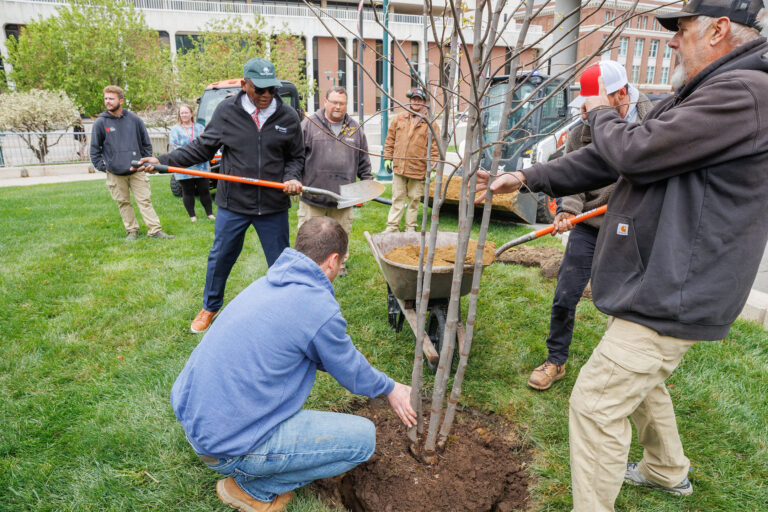
In honor of Earth Month, the med center organized events and activities during April.
The annual personal electronic waste and e-waste shredding event diverted many materials from the landfill:
- 6,111 lbs of electronic waste
- 8,642 lbs of personal documents
- 113 pairs of glasses
- 341 lbs of assorted media (VHS tapes, DVDs, CDs and floppy disks)
- 11 lbs of pop tabs
- 310 lbs of alkaline batteries
- 46 lbs of rechargeable/button batteries
- 31 bikes donated
Participants also donated $951 and 250 food items to the Clarkson College Cupboard and Closet.
On April 25, members of the med center community gathered for an Arbor Day celebration to plant an eastern redbud tree, named Rooty. It is located in the greenspace north of the Sorrell Center. Attendees enjoyed games, donuts and coffee, while Graham Herbst, a community forestry expert for the Nebraska Forest Service, shared insights into the benefits of trees for community resilience and health.
Earth Month celebrates ‘Healthy people, healthy planet’

This April, the med center celebrates the relationship between environmental sustainability and human health for Earth Month with the theme, “Healthy People, Healthy Planet: Strengthening Connections.”
The UNMC Office of Sustainability partners with departments across campus and with outside organizations that share a commitment to sustainability and health:
- Clarkson College Cupboard and Closet
- UNMC and Nebraska Medicine Information Security
- LiveGreen Ambassadors Employee Resource Group
- Healthy Earth Alliance UNMC student group
- Sodexo Food Services
- Community Bike Project of Omaha
Together, the UNMC Office of Sustainability and its partners are offering sustainability opportunities in April and beyond, including the annual e-waste recycling event, campus clean-up and photo contest. Visit the LiveGreen website for complete event details and registration information.
The e-waste recycling and document shredding event will be held Tuesday, April 29, from 10 a.m. to 6 p.m. and Wednesday April 30, 6 a.m. to 2 p.m. It will be at the UNMC Grounds Building (Annex 23) in Lot 17, 4650 Jones St.
“In our organization, information security and the office of sustainability are united by a common goal: protecting personal information through responsible data destruction and paper shredding,” said Sandra Cummins, senior IT security analyst for Nebraska Medicine. “By joining forces in Earth Month, we highlight the critical connection between environmental responsibility and data security, ensuring that confidential information is disposed of securely while reducing waste and promoting sustainability.”
Recycle e-waste and more April 29-30
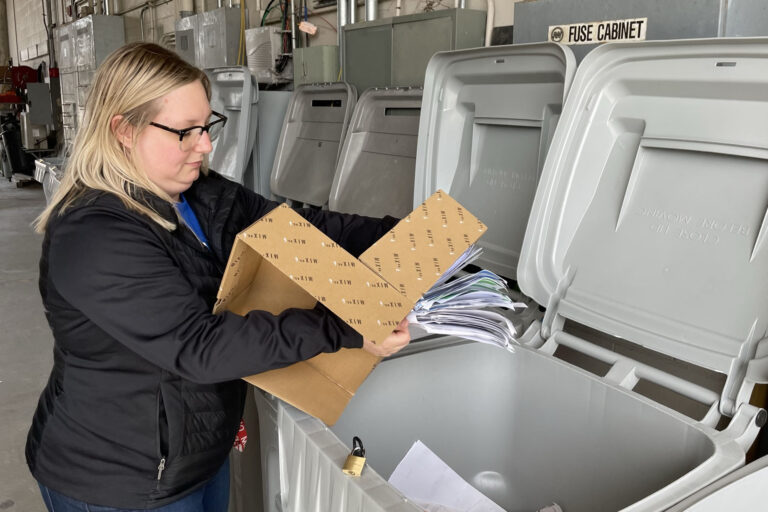
The med center’s annual e-waste recycling and document shredding event will be held over two days at the end of April – Tuesday, April 29, from 10 a.m. to 6 p.m. and Wednesday April 30, 6 a.m. to 2 p.m.
It will be at the UNMC Grounds Building (Annex 23) in Lot 17, 4650 Jones St.
The event offers a safe and environmentally responsible way to dispose of outdated electronics, ensuring that devices are properly recycled and that harmful materials are handled carefully. From old computers and phones to TVs and printers, attendees can drop off anything with a plug, circuit board or that runs on batteries.
Besides old electronics, many other items will be accepted to be recycled or reused:
- Physical media, including, CDs, DVDs and VHS tapes.
- Single-use and alkaline batteries.
- Any grade of paper and any paper document that someone wants shredded before it is recycled.
- Gently used eyeglasses. These will be taken to Truhlsen Eye Institute, where they will be reused for patients.
- Pop tabs. These will be donated to the Ronald McDonald House.
- Used bicycles. These will be refurbished through a new partnership with Community Bike Project of Omaha and donated back to individuals at the med center.
- Food donations. Items will be donated to Clarkson College Cupboard and Closet.
The event is scheduled during Earth Month, and other events are being held throughout April. Check out the list of events in this article.
Pat Wortman, the med center’s executive director of environmental health and safety, said his office is aligned with med center sustainability efforts.
“By implementing sustainable practices, such as reducing waste and managing disposal responsibly, we inherently improve environmental health and safety outcomes,” Wortman said.
Want to get involved with the event? Sign up to volunteer.
For more details, including what will or won’t be accepted, visit this webpage.
Grab those old electronics and paper documents
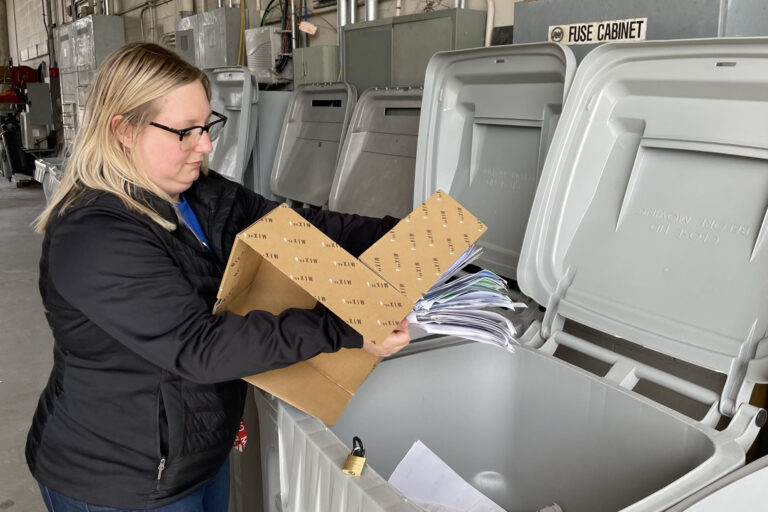
Earth Day is April 22, and the med center will celebrate all month long. This month’s theme is “Healthy People, Healthy Planet: Strengthening Connections.” It will highlight the link between human and environmental health, and the importance of strengthening connections with one another for mutual well-being.
Check out this list of Earth Month events, including the med center’s annual electronic waste and document shredding event. UNMC faculty, staff and students are invited to participate.
Personal electronic waste and document shredding event
Tuesday, April 29, 10 a.m. to 6 p.m. and Wednesday, April 30, 6 a.m. to 2 p.m. | UNMC Grounds Building (Annex 23)
Have unneeded electronics, batteries, bikes or paper documents laying around? Attend the med center’s annual recycling event. This year, in addition to accepting e-waste and old media, the UNMC Office of Sustainability will partner with the Community Bike Project of Omaha to collect damaged or unused bikes, which the organization will fix and donate back to the community. Sign up to be a volunteer for the e-waste event. For more details, including what will (or won’t) be accepted, visit this webpage.
Kelly Johnson webinar
Tuesday, April 1, 2 p.m. | Online
Kelly Johnson, director of systems/energy engineering services at the med center, will speak about capital projects supporting sustainability.
Farrah Grant presentation
Monday, April 21, noon to 1 p.m. | Sorrell Center, room 2014, or online
The LiveGreen Employee Resource Group will host Farrah Grant, an instructor from the University of Nebraska at Omaha, who will present on the concept of “climate hope.” Climate hope is the belief that, despite the daunting realities of climate change, solutions exist, and progress is possible.
Campus cleanup
Thursday, April 24, noon to 1 p.m. | 42nd and Emile streets
Help pick up trash around campus over lunchtime with the Blue Bucket Project. Volunteers should meet at the intersection of 42nd and Emile streets near the stethoscope sculpture. RSVP by filling out this form.
Arbor Day tree planting ceremony
Friday, April 25, noon to 1 p.m. | Green space by the Sorrell Center
Join the UNMC Office of Sustainability, HEAL student organization and the LiveGreen Employee Resource Group in the bi-annual tree planting event, which will include games, donuts and coffee. Graham Herbst, community forestry specialist for the Nebraska Forest Service, will present on the benefits of trees for community resilience and health. Click here to submit an idea to name the eastern redbud (Cercis canadensis) being planted this year. Inclement weather backup date is May 2, noon to 1 p.m.
Health care eco-challenge
All month | Online
Join the OneHealthcare EcoChallenge to take sustainable action directly related to health care and health topics. Click here to join the med center team and earn points. Top-scoring participants will be recognized and receive a local gift card at the end of the month.
Check out the Earth Month 2025 webpage for more events around the community.
‘MeatOut’ options available at the med center
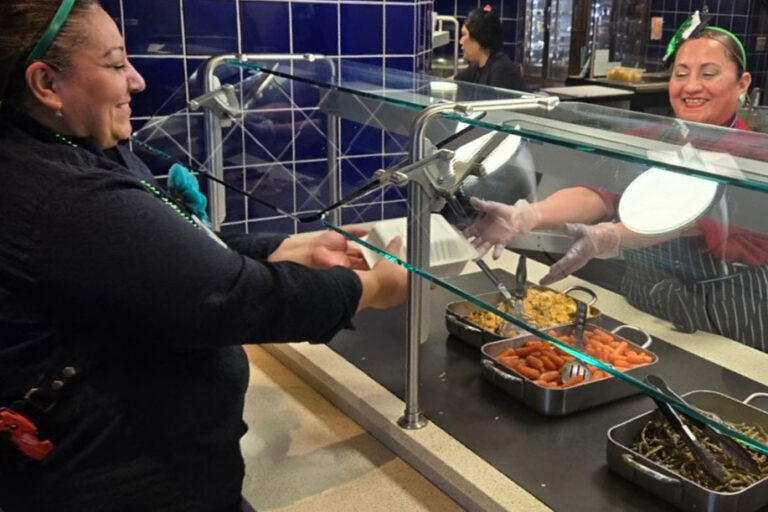
The med center will offer a “MeatOut” day on Thursday, March 20, by showcasing delicious and nutritious plant-based meals at Clarkson Café and Nebraska Café.
MeatOut is a 40-year campaign rooted in raising awareness around the benefits of plant-based eating for human health and sustainability.
In addition to regular menu items, Clarkson Cafe’s Innovation Station will offer a Thai tofu bowl, and Nebraska Cafe’s Mindful Station will have a vegetarian soup and a plant-based chicken cacciatore.
Elizabeth Peterson, the med center’s operations manager of food and nutrition, said Meatless Mondays are available all year at Nebraska Café’s Mindful Station, which offers a flexible menu that can accommodate various dietary preferences.
On Monday, March 24, Mindful Station will have portobello stroganoff with sautéed broccoli and Cajun-spiced roasted potatoes on the side.
“By offering delicious meat-free options, we provide everyone the chance to enjoy a healthy and sustainable meal without meat and explore new meals they may have not considered before,” Peterson said.
A plant-based diet can reduce the risk of health problems such as heart disease and diabetes, and improve cholesterol levels and blood pressure. Also, plant-based eating helps protect the environment by lowering carbon emissions, conserving water and preserving natural resources. Choosing meat-free options, even just for a few more meals than usual, is a simple yet impactful way to promote personal health and a sustainable future.
UNMC’s Green Labs Program to build on successful pilot
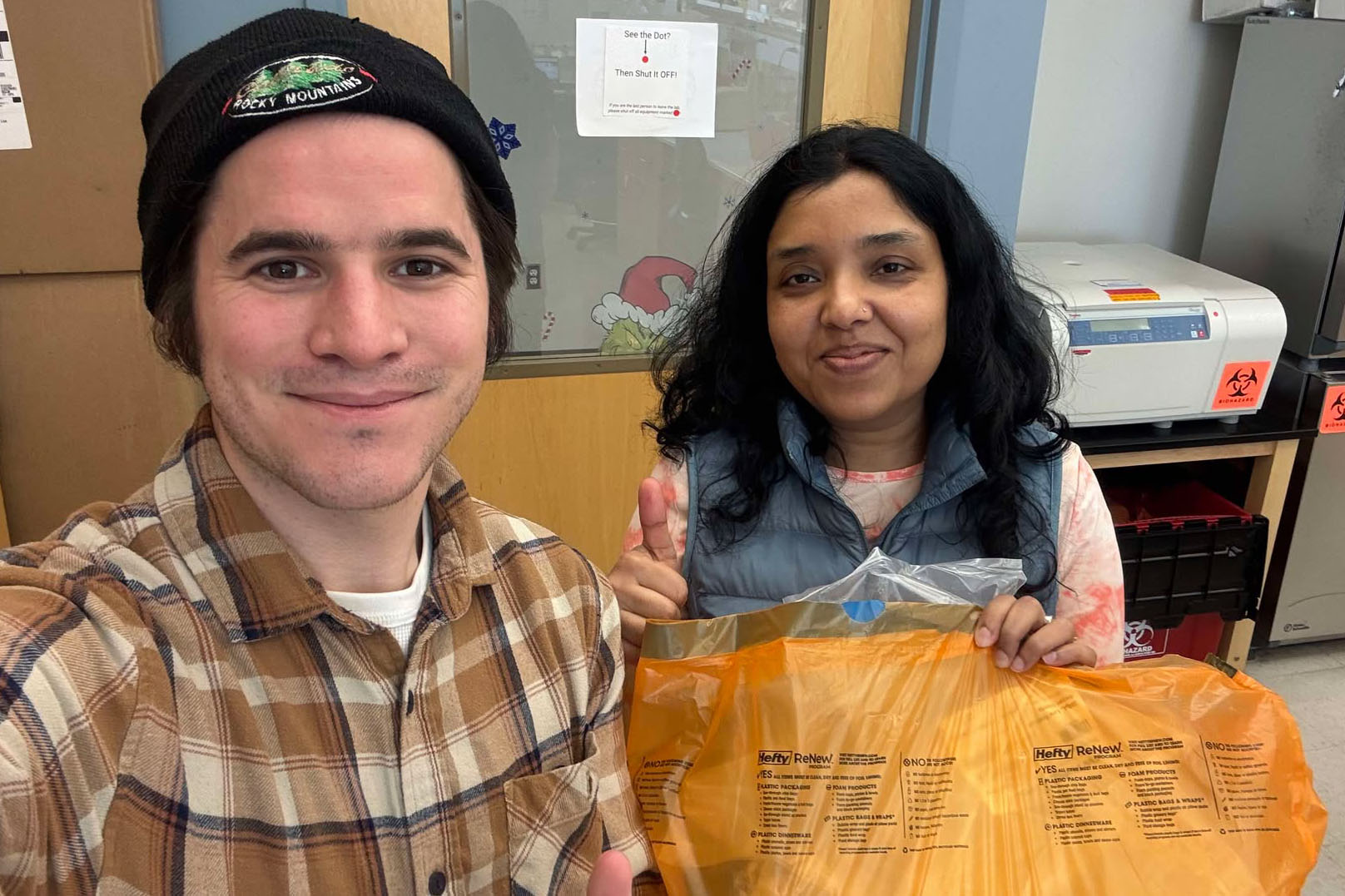
The UNMC Office of Sustainability is announcing the official launch of the Green Labs Program, following success of its recent pilot initiative.
The green labs pilot program concluded in November, with 16 labs signing up, seven submitting baseline scorecards and six submitting final scorecards. The participation exceeded expectations, allowing the UNMC Office of Sustainability to garner meaningful and encouraging feedback toward making research at the med center more sustainable.
Between May 2024 and November 2024, the program tested a novel process to support labs in optimizing their energy and water consumption, while also exploring ways to increase waste diversion and green purchasing. Participating labs were required to fill out an initial scorecard to establish a baseline measurement of the lab’s impact on resources and a final scorecard that reflected the various sustainability strategies labs implemented during the pilot.
Labs implemented sustainable practices such as performing cold storage preventative maintenance, adjusting lab sink flow rates and recycling gloves. By completing scorecard strategies, labs earned certification levels, allowing them to display badges in their labs and email signatures.
UNMC research labs that achieved certification levels are as follows (green indicates successful completion of 80% of available credits, silver 40%):
- Mirnics-Korade Lab – Green
- Gilk Lab – Green
- Ouellette Lab – Green
- Peeples Lab – Green
- Bayles Lab – Silver
- Augusto Lab – Silver
According to program estimates, the six labs that completed the pilot reduced their energy usage by an average of 15%, which is equivalent to avoiding 12 metric tons of CO2 emissions, or the same amount of emissions from about three homes’ annual electricity use.
Encouraged by these findings, the UNMC Office of Sustainability is scaling up and expanding the program across more departments, with a goal of fostering a culture of sustainability in research that supports campus and University of Nebraska System sustainability goals. Targets include engaging at least 10 new labs in the program and having at least five labs participate in the International Freezer Challenge.
Click here to fill out the interest form for the lab, and the UNMC Office of Sustainability will be in contact to get the process started.
Researchers can enter their lab in this year’s International Freezer Challenge if they are interested in energy reduction opportunities but aren’t ready to commit to the Green Labs Program.
Changes ahead for Park Omaha zones, signage
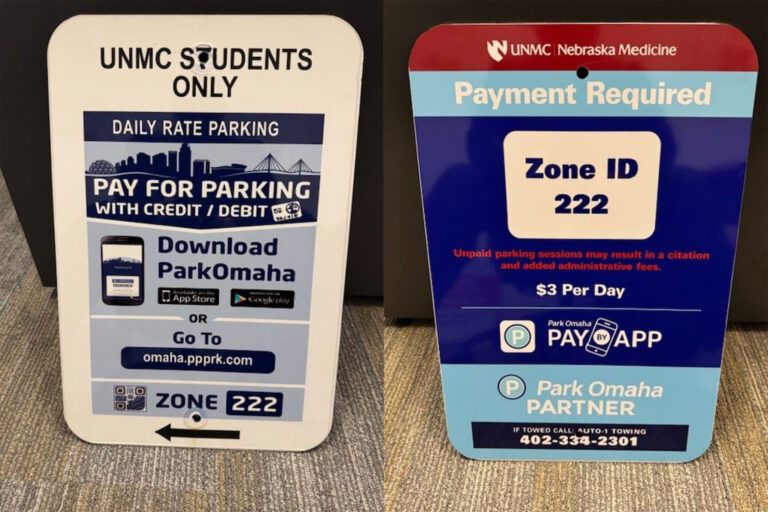
Med center staff and students who use the Park Omaha app for daily parking should take note of an upcoming change on campus.
By March 1, the number of campus parking zones within the app will increase from one zone for the entire campus to 14. The campus is moving from a single zone covering the entire campus (Zone ID 222) to Zone IDs 900 thru 913.
The app option is available at select lots on campus. Users download the Park Omaha app, create an account and use the app to pay $3 for 20 hours of parking.
The administrative change will allow UNMC Parking Services to gain better information about parking usage on campus.
New signs with the updated zone designations will be posted, so customers should be attentive to the Park Omaha signs in their parking location.
Recycling updates support med center waste reduction goals

The UNMC Office of Sustainability has updates to share on the med center’s waste infrastructure that will help advance its waste reduction goals.
These improvements support the medical center’s goal of achieving net zero waste, with a 90% landfill diversion rate by 2030. Staff and students can contribute by ensuring items are placed in the correct waste stream to prevent contamination, opting for reusable items, such as cups, plates and utensils, and educating others on waste reduction and proper waste sorting.
Together, these steps can make a meaningful impact on campus sustainability efforts.
Mixed recycling
Mixed recycling has been expanded to include small cardboard and paperboard items, which can now be flattened and placed in green bins along with rigid plastic and metal recyclables. To ensure effective recycling, remove any food residue before disposal. While updated signage will be installed across campus, everyone can support this transition by downloading and printing signage for bins in their spaces.
Additionally, changes have been made to the environmental services disposal process. Mixed recycling and cardboard collected inside buildings now will be placed in shared dumpsters or compactors and transported to a local materials recovery facility for sorting.
Paper recycling
Paper recycling procedures also have been refined. At Nebraska Medicine, in-patient and clinic spaces will have daily paper recycling collection, while office spaces will utilize centralized community bins for mixed paper recycling.
At UNMC, office spaces will rely on community bins, with blue deskside bins remaining available for convenience. However, staff will be responsible for transporting their mixed paper recycling to community bins within their departments.
Trash disposal for non-recyclables
For non-recyclable trash disposal, Nebraska Medicine office spaces will use centralized community bins, with environmental services supplying trash bin liners. At UNMC, similar changes will be implemented, though environmental services will not provide liners. Staff must transport their trash to designated community bins within their departments.
Community bins
A key component of these updates is the transition to community bins — centrally located waste bins accessible to everyone in a shared space. This system ensures items are disposed of correctly, reduces costs associated with plastic liners and encourages movement throughout the workday, promoting overall wellness.
For more information or to get involved, visit the LiveGreen Ambassadors webpage or join the LiveGreen Ambassadors Employee Resource Group. With questions, email environmental services.
Sustainability survey: How the med center sees sustainability
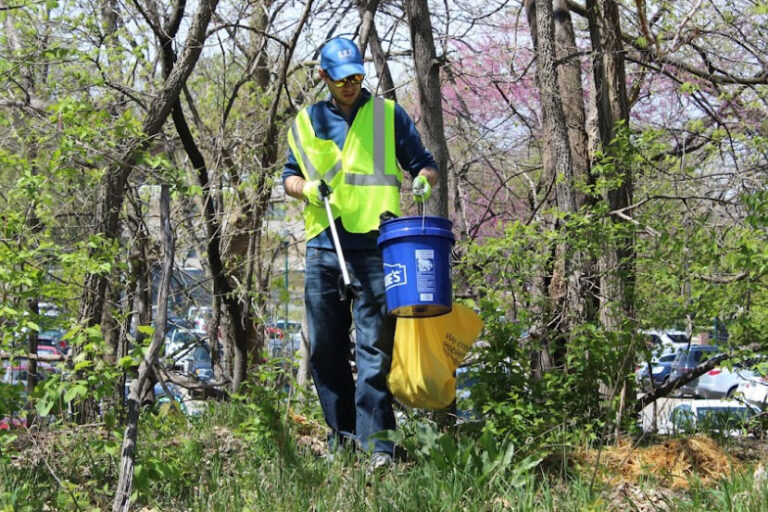
This year, almost 2,000 staff, students and faculty responded to the med center’s 2024 Sustainability Engagement Survey, almost 1,000 more responses than in 2022.
The survey results measured progress toward the med center’s campus engagement score, which combines five sustainability engagement dimensions to determine a single score between 0-100.
The overall score this year was 56, a two-point decrease from the score in 2022. When survey results account for differences in questions asked, there was virtually no change in score.
Key takeaways from the survey results:
- Waste diversion and reduction: The med center community is passionate about recycling and reducing waste. Of the trends that emerged, diverting waste from the landfill was the most popular topic – 40% of respondents mentioned waste diversion. When asked about their own sustainable behaviors and the behaviors of peers, three of the top four reported behaviors were waste-related:
- Reusable containers
- Recycling
- Printing double-sided
- Engagement and education: Respondents requested increases in engagement activities, communications and education about sustainability on campus. The number of respondents that mentioned education is up 7 percentage points to 10% since 2022. Energy savings was highlighted as a topic for educational opportunity, with 9% of participants indicating energy conservation/efficiency as an area of interest. These practices will be an area of focus in 2025.
- Active commuting: In 2024, 38% of trips to and from med center locations were made by carpooling, taking the bus, walking, riding a bicycle or working from home (modes other than driving alone in a vehicle). The prevalence of active commuting is an important way the med center community reduces greenhouse gas emissions. While slightly lower than in 2022 (by 2 percentage points), the campus community is maintaining sustainable and healthy transportation habits.
While the results show opportunities to grow and improve, they also highlight the med center community desire to participate in a more sustainable future.
Staff and students can join the med center’s sustainability mission by visiting the LiveGreen Ambassadors webpage and joining the LiveGreen Ambassadors Employee Resource Group.
To view this year’s Sustainability Engagement Survey report, visit the campus engagement webpage.
With questions or additional feedback about sustainability at the med center, email the UNMC Office of Sustainability.
UNMC to partner on new climate measurement center
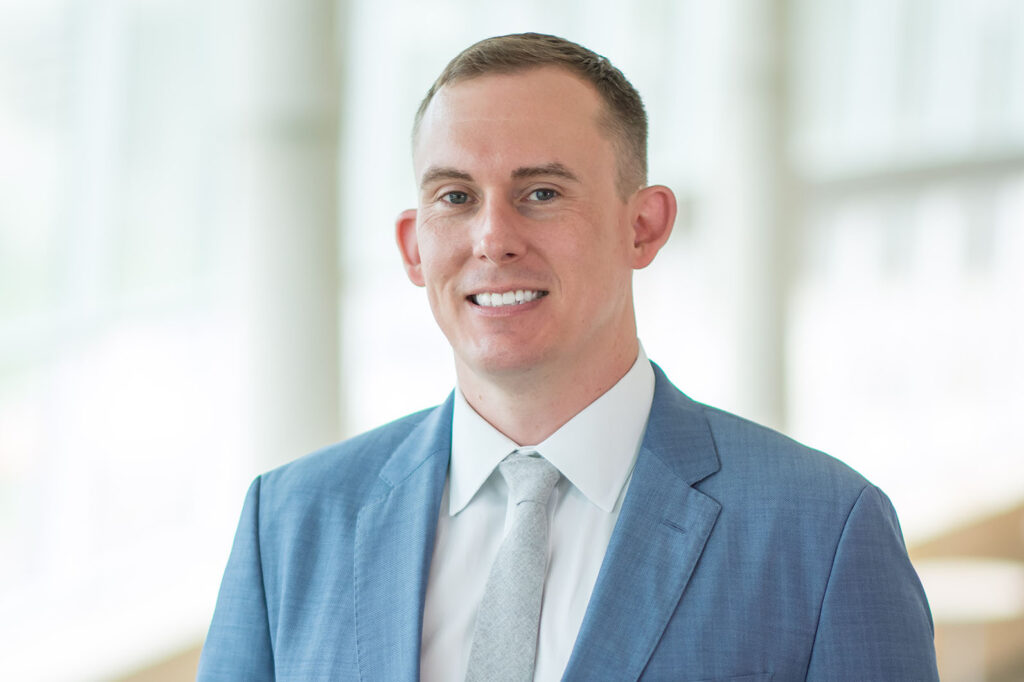
UNMC is a partner site for the new Climate Measurements Center of Excellence at the University of Vermont.
The center, funded by a $2.7 million investment from the U.S. Department of Commerce’s National Institute of Standards and Technology, will help federal climate impact assessment by providing more localized measurements through partners such as UNMC.
UNMC will help the center develop a standard for measuring these impacts, while also helping to work with local leaders and decision-makers to address their effects, said Jesse Bell, PhD, the Claire M. Hubbard Professor of Water, Climate and Health in the UNMC College of Public Health and director of the UNMC Water, Climate and Health Program.
“With support of the University of Washington, the Water, Climate and Health Program at UNMC will help with the health components of this new center,” Dr. Bell said. “We will coordinate working groups of public health and health care professionals to understand their needs for integrating climate information into their decision-making process.”
Dr. Bell said that by serving as a hub for climate assessment expertise, the new center will empower communities at a higher risk of the negative impacts of climate-related health outcomes to adapt to climate risks more effectively.
The center will mobilize scientists and experts at UVM and nationally to measure and respond to the diverse ways that climate affects U.S. communities, water resources, human health and food systems. Researchers will work with partners in 13 states and jurisdictions – in addition to Nebraska, participating states include Alabama and Washington – that will provide vital insights during the research and can implement solutions in their communities. More regions will be added over time.
The center also will address the lack of consistency across local climate change assessments, which can hinder attempts to mitigate climate change effects on the ground. While most current data on climate change damage covers large geographical areas, local detail is needed to prepare locally for extreme climate events. By connecting experts who can address climate resiliency needs at local levels, the center will generate and disseminate assessment frameworks and toolkits that officials can use to meet the challenges of a changing climate.
“Our interdisciplinary team, working across diverse geographies, will build climate resilience through collaboration with numerous stakeholders, ensuring that climate trends and impacts are addressed equitably, particularly for underrepresented populations such as women, communities of color and low-income groups,” Dr. Bell said.
Learn more about the Water, Climate and Health Program at UNMC by visiting its website.
Campus LiveGreen events highlight sustainability month
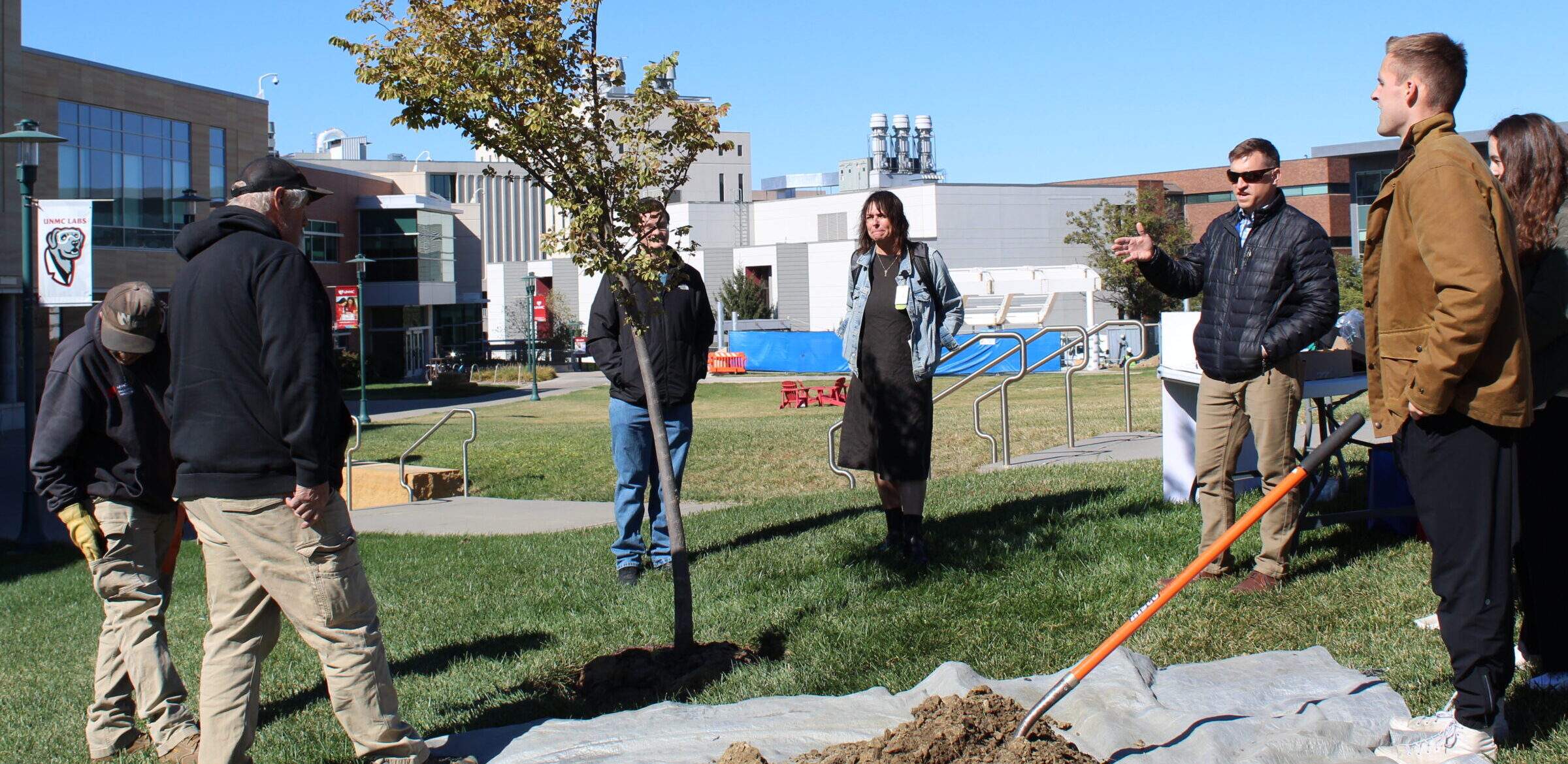
In October, the med center hosted several events to celebrate Campus Sustainability Month.
“No one of us can solve issues of sustainability on our own – it will take small and large efforts from everyone to make a difference,” said Eric Bloomquist, a member of the LiveGreen Ambassador Employee Resource Group and committee chair.
The ERG invites the med center community to join the group.
Bellevue Medical Center waste program
Bellevue Medical Center rolled out a new recycling program that will help reduce the amount of waste sent to the landfill. As part of the effort, 55 new slim recycling bins and 12 triple-bins were installed.
Sustainability Engagement Survey
The Sustainability Engagement Survey received almost 2,000 responses. Results of the survey will be announced shortly and will help improve campus sustainability efforts.
Health Care Culinary Contest
Culinary services joined the Health Care Culinary Contest, which challenged health care culinary professionals to create a delicious plant-based dish. The “Vibrant Veggie Power Bowl” was served in the Nebraska and Clarkson Cafés on Nov. 20.
LiveGreen Ambassador ERG retreat
The LiveGreen employee resource group held its first retreat on Oct. 18 at Hitchcock Nature Center. Grace McMinn, a LiveGreen ambassador, said, “Each member touches a different part of our community – a community that displays opportunities to better the campus’s ‘live-green mindset.’ I’m proud to be part of a group comprised of people who act like every day is Earth Day.”
Campus cleanup
In collaboration with the Blue Bucket Project, the UNMC Office of Sustainability and LiveGreen ambassadors collected litter on Oct. 10 from the area around the Davis Global Center. Participants collected two bags of landfill waste, half a bag of recycling and one bag of Hefty ReNew Bag materials. The office also participated in Terracycle’s Writing Instruments Recycling Program by shipping about 6,500 disposable writing instruments to be made into new recycled products.
Tree planting
On Oct. 15, the UNMC Office of Sustainability partnered with UNMC grounds to plant a Frontier elm. “Nimbus” is located in the green space north of the Lozier Center for Pharmacy Science.
As ‘Green Lab’ pilot winds up, Drs. Mirnics, Korade led the way
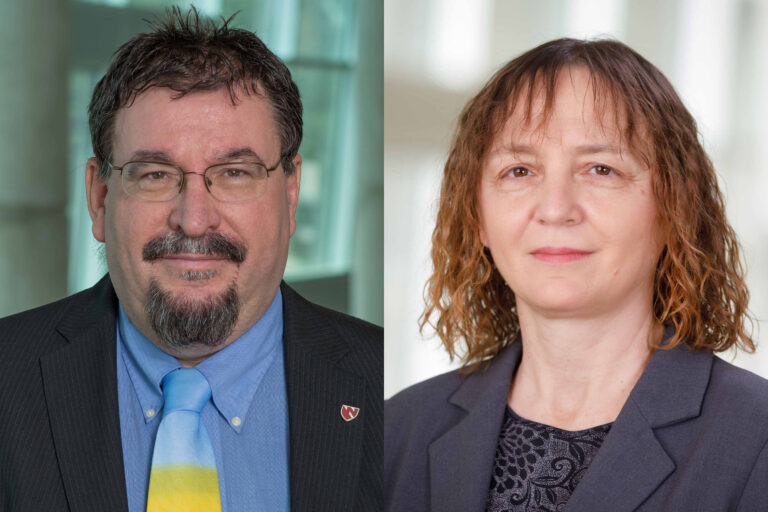
The laboratories of Karoly Mirnics, MD, PhD, director of the UNMC Munroe-Meyer Institute, and Zeljka Korade, DVM, PhD, professor of pediatrics at UNMC, led the way in UNMC’s initial pilot of a “Green Labs” program.
They achieved the highest certification level – green – by completing more than 80% of available credits in the program.
“We all have to do our part to preserve our amazing world for future generations,” Dr. Mirnics said. “It starts with each of us, locally, and not only as a global process.”
Since the pilot launched in May, the lab has led the way in completing the credits within the pilot and providing valuable feedback for program coordinators.
Dr. Mirnics said the lab leveraged the program as an opportunity to “review how we operate, become less wasteful and be more cognizant of how our work affects the environment.”
Allison Anderson, the lab’s Green Lab navigator:
- Completed the baseline and final scorecards for the lab, working with lab staff to provide updates and answer questions.
- Served as the main point of contact between the lab and the UNMC Office of Sustainability, identifying areas for improvement in the lab.
- Provided meaningful feedback and input throughout the design and development of the program, helping program developers to better understand the issues faced by participants and find solutions.
For more information about the Green Labs pilot, visit the program website.
Sustainability Engagement Survey seeks campus feedback

Every two years, the UNMC Office of Sustainability surveys the campus community to assess engagement in sustainability initiatives at the med center. All faculty, students and staff are encouraged to participate.
Click here to take the anonymous survey anytime between Oct. 28 and Nov. 8. It should take about seven to 10 minutes to complete. After finishing the survey, respondents will be directed to a separate survey page to enter into a drawing for one of eight $25 gift cards to local businesses.
The Sustainability Engagement Survey asks respondents to weigh in on five dimensions of sustainability engagement at the med center:
- Awareness of efforts to be more sustainable.
- Knowledge about ways to be sustainable.
- Behavioral frequency of sustainable behaviors.
- Perceived behavioral frequency of the sustainable behaviors of others.
- Familiarity with sustainability topics.
The survey will help the UNMC Office of Sustainability identify opportunities to raise awareness and develop impactful programs and campaigns by highlighting the organization’s sustainability strengths and areas for improvement.
The survey results also will allow us to measure progress toward the med center’s campus engagement score, which combines the five dimensions to determine a single score between 0-100.
Lisa Kinney, vice president of the LiveGreen Ambassador Employee Resource Group, said individual behavior change is important to help the med center reduce its environmental impact.
“It’s important for communities to come together to make sustainable changes and bring our planet back into balance,” she said. “There are adjustments you can make in your daily routine to use less water, reduce emissions and decrease single-use products that end up in landfills.
“Even more impactful is what you can implement on a grander scale at Nebraska Medicine and UNMC.”
Kinney and the ERG urge all campus community members to make their voices heard by taking the survey.
This year, the survey will overlap with Campus Sustainability Month, an international celebration of sustainability in higher education. To celebrate, consider attending any of the events and educational opportunities being held across campus.
With questions, contact the UNMC Office of Sustainability.
Events set to celebrate Campus Sustainability Month

Held every October, Campus Sustainability Month is a celebration of sustainability in higher education in which campuses across the world engage and inspire campus community members to become sustainability change agents.
To celebrate, the med center is hosting a series of events and educational opportunities.
In addition, details are forthcoming about this year’s Sustainability Engagement Survey, so watch for the survey launch and take time to fill it out. Results from the survey will help the med center monitor and improve its campus sustainability efforts.
Practice Greenhealth annual membership drive
To create a Practice Greenhealth account:
- Go to the Practice Greenhealth website and in the upper-right corner click “sign up” or login after creating an account.
- Use hospital/member code: 166757.
- Members can access the many resources on the website and register for and attend any of the events.
Tree planting ceremony: TBD, green space north of Lozier Center for Pharmacy Science
HEAL is partnering with UNMC grounds to host a tree planting ceremony. Help improve green spaces on campus while learning more about campus sustainability efforts. Attendees can submit ideas for naming the tree, or submit an idea here. The event is being rescheduled from its original date of Oct. 3, and details will be announced soon.
Campus cleanup: Oct. 10, noon-1 p.m., Sorrell Center for Health Science Education
Join in picking up trash around campus over lunchtime with the Blue Bucket Project. Volunteers will meet near the Healing stethoscope statue outside of the Sorrell Center. Register here and invite friends, coworkers and classmates.
LiveGreen Ambassador ERG retreat: Oct. 18, noon-5 p.m., Hitchcock Nature Center
The LiveGreen Ambassador ERG is holding its first retreat. Attendees must be members of the ERG, although anyone is welcome to become a member and attend. Join the LiveGreen Ambassador program here. Members will receive information on this event in their email.
Health care culinary contest: Oct. 1-Nov. 30, online
Eating a plant-based diet can not only be beneficial to human health, but also it can reduce the carbon footprint and mitigate climate change. Every year, Health Care Without Harm hosts a contest for health care culinary professionals to take their plant-based menus to a new level. As a new Practice Greenhealth member organization, the med center now is eligible to participate. Details about the med center’s first contribution will be forthcoming.
Take action in October by:
- Attending one of these events
- Signing up to be a LiveGreen Ambassador
- Sustainably commuting with the TravelSmart program
- Refamiliarizing yourself with the med center’s sustainability goals
- Inviting peers to do the same
Extreme heat has major health impacts

As energy curtailment season continues, LiveGreen offers information on heat-related concerns.
Last month, the UNMC College of Public Health’s Climate and Health Program hosted a webinar to inform health care providers of the impacts of extreme heat on human health for Nebraska communities.
Topics included how heat alerts are handled, current trends in heat-related illnesses, populations at higher risk and treatment of these illnesses. This webinar was timely, as the medical center is now in the energy curtailment season and has curtailed once this summer already.
Extreme heat: what is it?
In most of the United States, temperatures above 90°F can typically be described as extreme heat. Extreme heat is usually expressed with a measurement of the heat index, which accounts for humidity and air temperature. It also is consistently ranked as the deadliest type of extreme weather in the United States.
How does extreme heat impact human health, and how can we stay safe?
Extreme heat is not just an inconvenience. Rather, it has significant implications for human health and wellbeing. When the body is unable to cool itself, there is the danger of illnesses such as heat cramps, heat exhaustion or heat stroke. Some populations are at a greater risk of these illnesses, including the elderly, young children, those with mental illnesses or chronic diseases, outdoor workers and members of low-income communities.
According to Chris Dethlefs, MD, a resident in the UNMC Department of Internal Medicine, the most effective management strategy for a heat-related illness is to cool off the body as quickly as possible by submerging in an ice bath. To avoid serious health impacts, the goal is to lower the core body temperature to below 104°F in less than 30 minutes.
How does sustainability interact with heat and health?
Of the connection between sustainability efforts and patient outcomes in the face of extreme heat, Dr. Dethlefs said:
“As our communities face increasingly intense heat stress and its acute and chronic impacts on health, we at UNMC are well positioned to help build adaptive capacity in our city through direct patient care, anticipatory education and resource coordination.
“This begins in part with advancing sustainability measures within our own institution. Adaptability and sustainability are fundamentally intertwined in the face of environmental pressures such as extreme heat, and they will be essential qualities for UNMC to continue supporting the health of our communities in our changing climate. Many students, faculty, and staff are actively making strides towards this goal, thereby shaping the med center itself into a more resilient agent for change”.
To learn more about heat-related illnesses, who is most at risk, and how to prepare for the increasing prevalence of extreme heat events, you can read the booklet produced by the Center for Disease Control (CDC) and the Environmental Protection Agency (EPA).
For another resource on heat-related illness, including to read in more detail about how some people have more difficulty in extreme heat than others, members of the medical center community can check out Nebraska Medicine NOW’s article, “How does excessive heat affect the body?”.
LiveGreen Ambassadors becomes Employee Resource Group

Marking a new chapter in the med center’s sustainability journey, the LiveGreen Ambassador program has officially become an Employee Resource Group on campus.
The LiveGreen Ambassador ERG joins a range of other established groups that encourage people around the med center to find connection and community with others. The Employee Resource Groups are open to all UNMC and Nebraska Medicine faculty, staff and students.
Uniting employees and students with a shared vision of environmental stewardship, the new Employee Resource Group builds on the med center’s long-established LiveGreen Ambassador program supported by the UNMC Office of Sustainability.
Jerrod Bley, sustainability manager, said the shift represents an exciting new chapter for the LiveGreen Ambassadors.
“It really empowers our amazing volunteers at the medical center, helping them become a more organized and mission-driven force on campus,” Bley said. “Their passion for making meaningful, lasting and sustainable improvements within our organization will shine even brighter, making a bigger impact on our community and environment.”
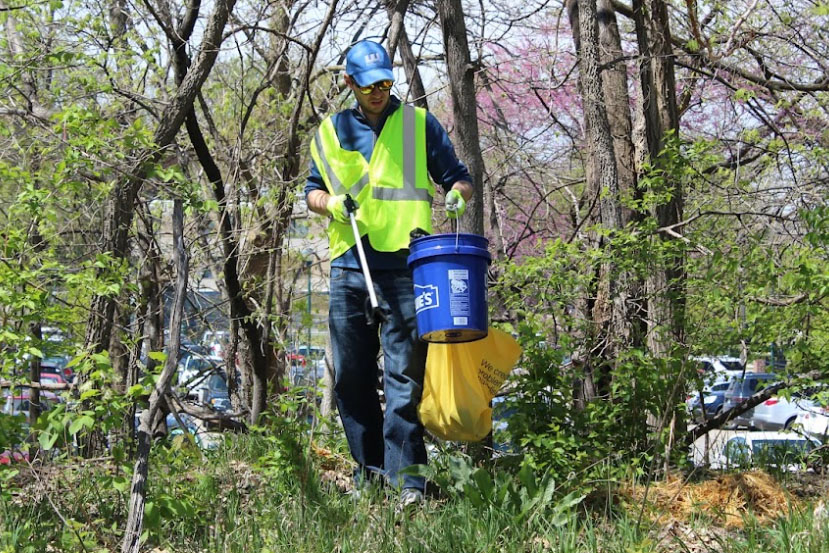
The group hopes to offer members opportunities to participate in meaningful sustainability initiatives, contribute to the med center’s sustainability goals and make a positive impact on the med center and the community. It also will support members as they continue to provide exceptional care, education and research at the med center.
The ERG’s president is Andrew Kirchner, a physician assistant in thoracic and cardiac surgery at the Heart and Vascular Center at Durham Outpatient Center.
Said Kirchner, “Combining the resources of Nebraska Medicine’s Department of Engagement, Outreach and Belonging with the mission of the LiveGreen Ambassadors will broaden our communication reach to increase awareness about both general sustainability on campus and specific initiatives. I hope to increase our pool of excited, dedicated members to conceive, contribute to and execute sustainability projects on campus.”
To learn more about the LiveGreen Ambassador program, visit the LiveGreen Ambassadors webpage. Click this link to join the LiveGreen Ambassadors Employee Resource Group.
Med center will practice energy curtailment in summer heat
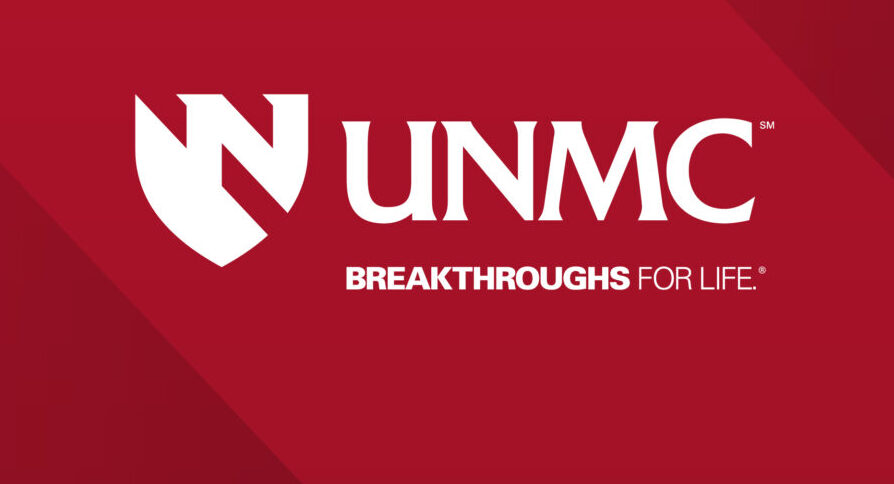
As temperatures rise this summer, the med center again will be implementing energy curtailment days to ensure the efficient operation of critical systems.
Energy curtailment is a practice designed to reduce energy consumption during periods when energy systems are under significant strain, such as times of extreme heat or humidity. Patient care and research spaces are not affected by energy curtailment.
During curtailment, the med center community is asked to reduce their energy usage by:
- Closing shades, blinds and curtains to reduce solar heat gain.
- Closing neighbors’ window coverings and turning off their lights and equipment if they aren’t on campus.
- Lowering light levels and turning off lights in unoccupied areas.
- Turning off and unplugging unused electrical equipment, such as computers, coffee makers, printers and chargers. Equipment is recommended to be charged after 7 p.m.
- Shutting fume hood sashes when not in use (“Shut the Sash!”).
- Considering working remotely on curtailment days. Coordinate with the appropriate manager.
- Opening doors manually instead of using accessibility buttons.
- Using stairs instead of an elevator if possible.
- Reminding others to make these changes.
To report spaces colder than 66 degrees or warmer than 78 degrees, call 2-3347 (Nebraska Medicine) or 9-4050 (UNMC).
Taking part in curtailment days is crucial for the med center because it:
- Ensures continuity of essential hospital and research systems.
- Reduces pollution by lowering greenhouse gas emissions.
- Decreases utility costs.
- Supports the med center’s Net Zero sustainability goals by reducing energy consumption and promoting sustainable practices.
Colleagues also can participate in the UNMC Office of Sustainability’s Energy Conservation EcoChallenge to track conversation efforts and enter for a chance to win a gift card to a local sustainability business.
To learn more about energy curtailment at the med center, visit the LiveGreen guidance web page.
Med center makes an impact during Earth Month
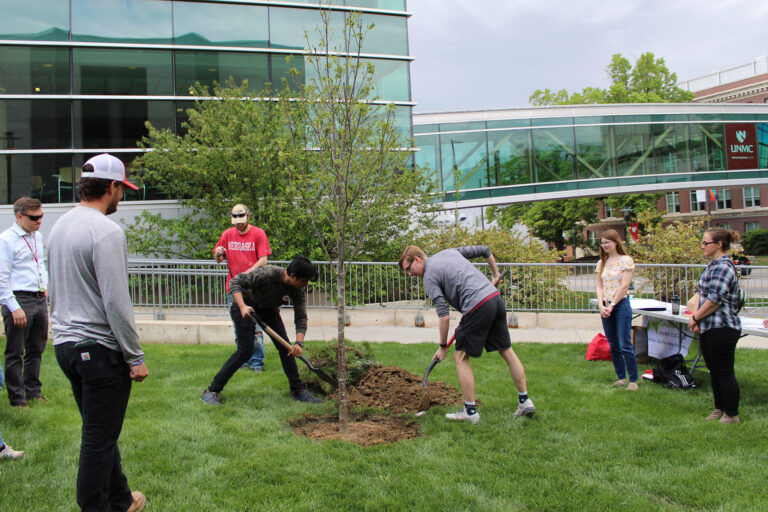
To celebrate Earth Month, the med center hosted events and opportunities to promote sustainability throughout the month of April and the beginning of May.
On April 9, the UNMC Office of Sustainability hosted a webinar about urban pollinator habitats and their impact on human health. The speakers were Benjamin Vogt, owner of the prairie-inspired design firm Monarch Gardens, and Bob Gittins, president and founder of Nebraska Monarchs.
At the LiveGreen Ambassador kick-off event, faculty and staff celebrated the program becoming an Employee Resource Group on campus. To learn about the program and its impact on campus climate efforts, visit the LiveGreen website.
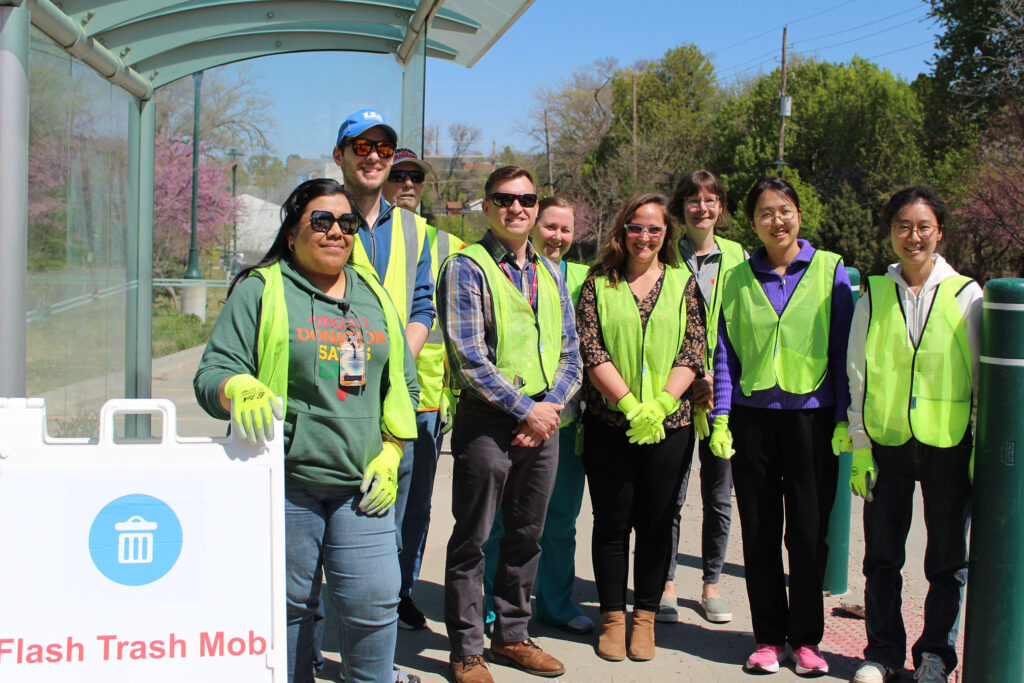
In collaboration with the Blue Bucket Project, the UNMC Office of Sustainability hosted a “Flash Trash Mob” on April 24 to collect litter from the native prairie area surrounding Parking Lot 64. Participants collected two full bags of landfill waste, one of recycling and one of Hefty Renew Bag materials.
At the Arbor Day tree planting event, students and staff planted a Japanese Lilac tree named “Kibo,” which means “hope” or “aspiration” in Japanese. It is located near Williams Science Hall in the Ruth and Bill Scott Student Plaza.
Also at the Arbor Day event, attendees heard from the Healthy Earth Alliance student group about the med center’s 2023-2024 Planetary Health Report Card. That worldwide initiative supports students at health professional schools to celebrate their institution’s environmental successes and identify opportunities for improvement.
Review the med center’s summary report and see the scores here.
The annual personal electronic waste and techno trash shredding event on May 7 and 8 collected $782 and 290 food items to be donated to the food pantry.
Materials diverted from the landfill were:
- 3,969 pounds of electronic waste
- 2,850 pounds of personal documents
- 86 pairs of glasses
- 64 pounds of assorted media
- Nine pounds of pop tabs
- 135 pounds of alkaline batteries
- 30 pounds of rechargeable/button batteries
Throughout April, the UNMC Office of Sustainability hosted the One Healthcare EcoChallenge, an online platform that encourages participants to weave sustainable actions into their daily lives. The participants saved 456 gallons of water, 700 pounds of carbon dioxide and traveled 138 miles without driving a car. Lindsay Bruce was randomly chosen as the winner of the med center’s challenge.
Also in April, the office of sustainability hosted an online photo contest to showcase how participants engage with nature. Congratulations to winner Stephanie Le.
To participate in sustainability initiatives and activities year-round, contact Jerrod Bley at the UNMC Office of Sustainability.
Green Labs initiative to promote sustainable research

UNMC and the med center campus in Omaha is a world-class research facility, with more than 740,000 square feet of dedicated research space, making it a world leader in health research.
Lab spaces are resource intensive. In comparison with standard office spaces, laboratories use five- to 10-times more energy and five-times more water. Laboratory researchers generate around 15-times more plastic waste than the average individual, with labs being responsible for a total of 5.5 million tons of plastic waste per year.
The med center’s Green Labs Program complements the med center’s institutional sustainability goals, as well as the University of Nebraska System’s 2023 sustainability plan.
The UNMC Office of Sustainability is collaborating with the UNMC Office of the Vice Chancellor for Research to drive optimization in energy and water consumption, while exploring innovative and practical ways to manage waste downstream and upstream by working with procurement to offer more sustainable options for researchers.
The voluntary program is designed to support lab personnel who are interested in implementing measures and adopting behaviors that will reduce environmental impacts without sacrificing research quality, safety standards or lab productivity.
Participants will be asked to fill out an initial survey to establish a baseline and a post-pilot questionnaire seeking feedback on the process and resources. If a UNMC lab is interested in joining the Green Labs program, consider signing up for the pilot. Click here to fill out the interest form for the lab, and the UNMC Office of Sustainability will be in contact to get the process started.
Before submitting the form, consider discussing the program with lab personnel to approve participation and determine who will serve as the lab’s representative throughout the pilot.
To kick start the Green Labs pilot program, the med center is participating in the International Freezer Challenge. This free competition offers guidance and resources to optimize a lab’s cold storage for better sample access and improved sample integrity, while reducing energy usage.
Enrollment in the Green Labs program is not required to participate, but colleagues who are interested can fill out the same interest form to start receiving information about the challenge.
For more information, including viewing the Green Labs program structure and program goals, visit the LiveGreen web pages for the Green Labs Program and the Freezer Challenge.
Earth Month will showcase nature and biodiversity
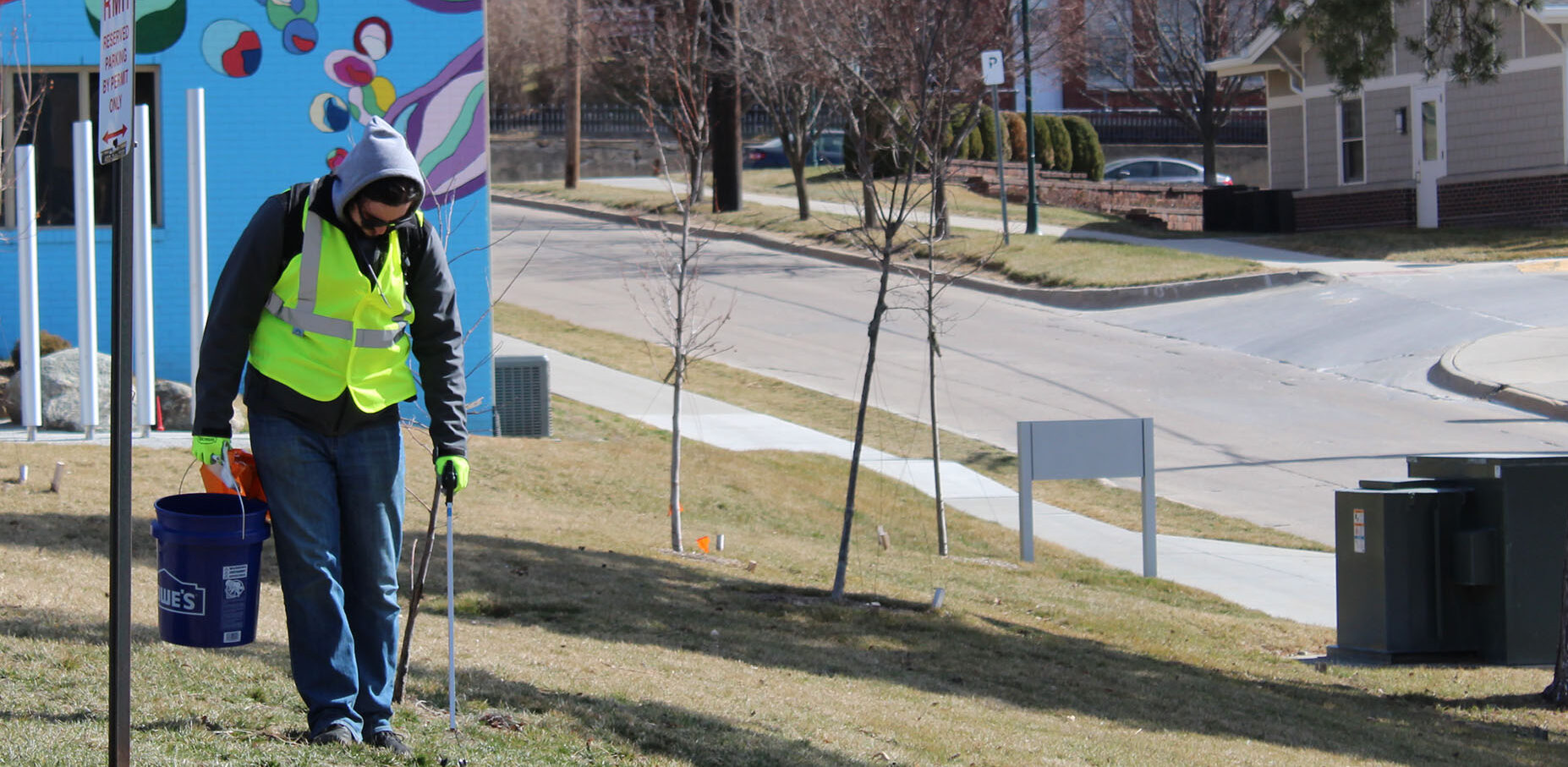
April 22 is Earth Day, and the med center will celebrate Earth Month throughout April, focusing on nature and biodiversity. The events offer opportunities to learn more about how the med center improves the community’s biodiversity and what the med center is doing to maintain a natural environment.
Check out this event list to learn how to participate in the Earth Month celebrations and engage with nature.
Nature photo contest: All month, online
The UNMC Office of Sustainability is hosting a photo contest. Entrants can share how they interact with nature on or off campus during April for the chance to win a gift card to a local business or an upcycled lab coat tote bag.
Health Care Ecochallenge: All month, online
Join the Health Care EcoChallenge, where you can take sustainable action directly related to health care and health topics. Click here to join the med center team and earn points. Top-scoring participants will be recognized and receive a local gift card or a lab coat tote bag at the end of the month.
Campus cleanup: April 24, noon-1 p.m., Lot 64 (native prairie area)
Note: Due to the possibility of severe weather, the date of the event has been changed from April 16 to April 24. Join in picking up trash around campus over lunch time with the Blue Bucket Project. A group will be cleaning up at Lot 64 around the native prairie, making sure the prairie is clean while also learning more about its benefits and other engagement opportunities. Register here and invite friends, coworkers and classmates.
Arbor Day tree planting ceremony: Wednesday, May 1, noon-1 p.m., at the far west end of the Ruth & Bill Scott Student Plaza between the Sorrell Center and Williams Science Hall.
Note: Due to the weather, the date of the event has been changed to May 1. Join the UNMC Office of Sustainability, HEAL, and UNMC Student Senate in the biannual tree planting event for the planting of a Japanese lilac tree. Help improve green spaces on campus while learning more about the med center’s planetary report card. Stickers, snacks, seeds and saplings will be available, and participants will have the chance to name the tree being planted.
Webinar, ‘Urban Pollinator Habitat: Supporting Health & Wellness’: April 9, noon-1 p.m., virtual
The UNMC Office of Sustainability will host an online webinar to teach about urban pollinator habitats and their impact on health. The two guest speakers will be Benjamin Vogt, owner of the prairie-inspired design firm Monarch Gardens, and Bob Gittins, president and founder of Nebraska Monarchs.
LiveGreen ambassador kick-off: April 19th, 12-1 p.m., virtual
LiveGreen Ambassador Program has officially become an Employee Resource Group at the med center. Join the group on April 19 to begin planning what the LiveGreen Ambassador Program will look like this year. The program is an excellent opportunity for faculty and staff to create climate action on campus. To learn more about previous efforts by LiveGreen Ambassadors, go to the LiveGreen website.
Personal electronic waste and techno trash shredding event: May 7, 10 a.m.-6 p.m., and May 8, 6 a.m.-2 p.m., UNMC grounds building
Earth Month events will extend into May with the med center’s annual recycling event. Bring e-waste and old media to be recycled. Seedlings and wildflower seed packets will be available, courtesy of the Papio-Missouri River Natural Resources District. Details are available on the website. If interested in volunteering at the event, click here.
Net zero waste goals met for Employee Appreciation Day
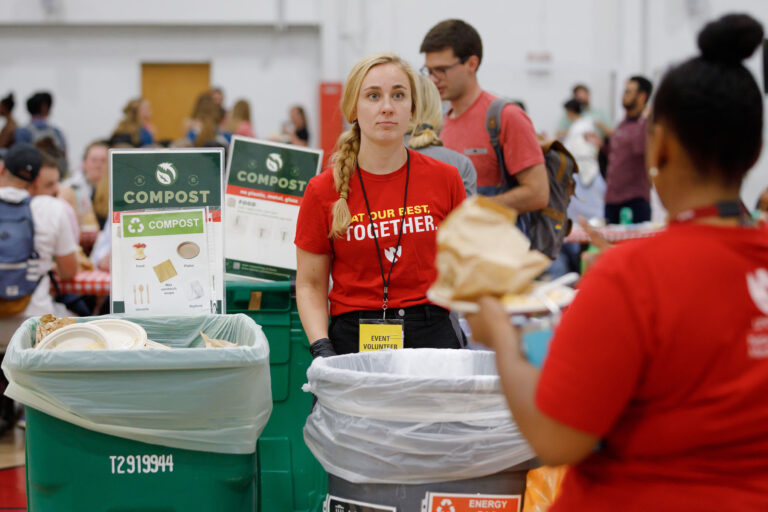
The UNMC Office of Sustainability held a successful zero-waste event at UNMC’s Employee Appreciation Day, meaning that at least 90% of waste by weight was diverted from the landfill.
Waste station volunteers assisted attendees in placing their waste in the correct stream. They also educated and raised awareness about sustainability efforts on campus – especially those that contribute to the med center’s net zero waste and engagement goals.
Of the 132 pounds of waste generated across the event’s three locations, a total of 119 pounds was diverted from the landfill by sending it to compost, recycling or the Hefty ReNew Program that processes waste into new resources.
The breakdown of waste streams was:
Compost: 69 pounds
- Plates
- Napkins
- Leftover food
Recycling: 41 pounds
- Water bottles
- Aluminum cans
- Plastic cups
Hefty ReNew Bags: Nine pounds
- Chip bags
- Utensils
- Other soft plastics
Landfill: An event that drew more than 500 UNMC employees generated only 13 pounds of trash.
Emily Wiley, an employee in the UNMC College of Allied Health Professions and a LiveGreen Ambassador, served as one of the volunteers at the event.
“Hearing those numbers at the end of the day, and knowing that we did it with a small team, was such a huge accomplishment,” Wiley said. “I hope more LiveGreen Ambassador volunteers will join future events to keep our zero-waste streak going strong.”
Anyone planning an event at UNMC can plan a zero-waste event. Check out the Office of Sustainability’s Zero Waste Event Toolkit or contact the Office of Sustainability to discuss.
See a leak, report a leak: Support water conservation

Water is an important resource, and each drop counts. And the med center takes water conservation seriously. One easy but significant way to help is to report water leaks as soon as possible.
Here are the steps for how to report a leak and why it’s important for the organization and the environment. To learn more about water conservation, explore this guide, “LiveGreen: The Importance of Water Conservation.”
How to report a water leak at the med center:
- For emergencies, call 402-559-4050, and the help desk will create a work order and call facilities immediately.
- To report non-emergent leaks, go to the UNMC facilities work order submission page.
- Submit the work order for maintenance requests. This includes repairs, electrical needs, installation requests and are all directed to a building’s zone based on information collected in the maintenance ticket. This means that if the location is incorrectly noted or not filled out, the request will not route correctly. Provide essential details such as contact information, the location of the leak and a brief description of the issue.
- For help finding a building, people on the med center campus can click here to view the UNMC facilities buildings and zone map.
Why reporting leaks matters:
- Water is finite and important. Reporting leaks helps ensure that every drop is used efficiently and minimizes waste.
- The med center is committed to sustainability and reducing its environmental footprint. Reporting leaks supports the med center’s net zero water sustainability goal and demonstrates a commitment to responsible resource management.
- Neglected leaks can escalate into more extensive issues, causing structural damage and mold growth. Early reporting mitigates these risks, ensuring the health and safety of patients, colleagues and visitors.
- Reporting a leak sets an example for others, inspiring colleagues to take responsibility for maintaining the med center’s buildings and grounds and contributing to a more sustainable future.
Take action today
Reporting water leaks is a small action that can yield big results. By following the easy steps outlined above, everyone can play a vital role in the med center’s water conservation efforts.
Visit the UNMC facilities work order submission page to report water leaks. Working together, med center colleagues can reduce waste, save money and protect the environment.
LiveGreen: Budget-friendly tips for winter energy conservation
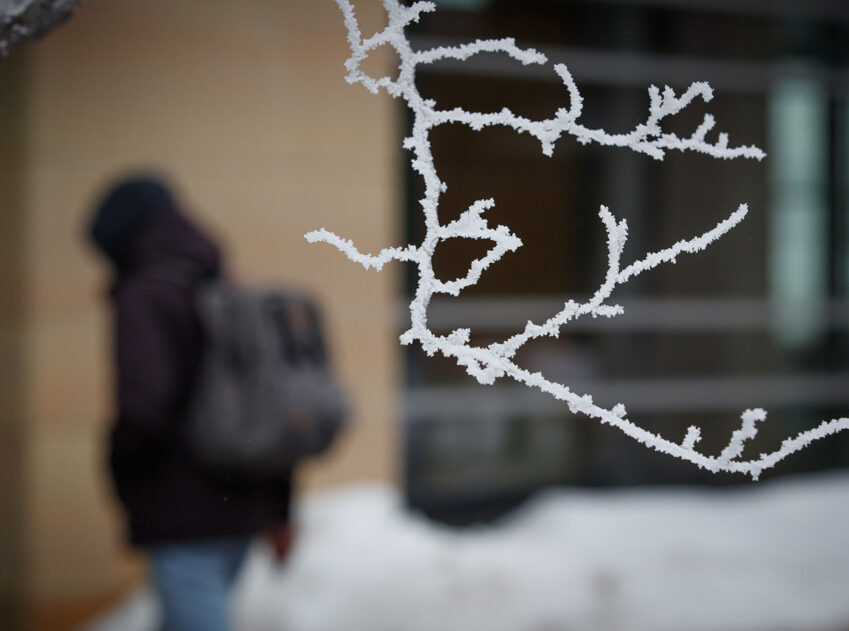
Whether someone is a homeowner or a renter, winter weather can feel like a threat to their home and family.
As temperatures drop, there are several home winterization techniques people can employ to ensure they don’t spend a fortune on energy while also improving their family’s comfort and safety.
Check out this short video from OPPD to prepare homes for cold weather.
Winterization, or preventative measures to prepare for the harsh impact of the winter months, can significantly improve a home’s performance and the health of occupants. Benefits include improved indoor air quality, less temperature related illness and reduced hypertension.
The financial stress associated with the heating season also can take a toll on mental health. There are several local assistance programs to explore when home weatherization work is needed, including Habitat for Humanity’s Home Improvement Program, OPPD’s Energy Assistance Program and federal programs such as the Low Income Home Energy Assistance Program.
The most thorough approach to addressing energy loss in winter, and throughout the year, is to conduct a home energy audit. If that’s not an option, there are other low-cost options available.
One of the most effective winterization strategies is to make repairs on areas in the home where heat loss commonly occurs. Drafty windows and doors, for example, can be inexpensively and easily addressed by caulking cracks and holes, installing weatherstripping or door sweeps and applying heat shrink plastic film to windows. Adding insulation can act as a winter coat for a home, reducing the chance of heat loss in areas where heat can radiate to the outside, such as exterior walls, attic access doors and rim joists.
Opening the blinds to let in sunlight and closing them at night is an easy and practical measure that can be adopted at the office and at home. Lowering the thermostat during the night and during the day when nobody is home also can save money and energy. According to the U.S. Department of Energy, households can save as much as 10% a year on heating and cooling by turning their thermostats back 7 degrees to 10 degrees from normal settings for eight hours a day.
Another option is investing in a smart thermostat, which analyzes a home’s energy usage patterns and automatically adjust settings for energy efficiency while keeping homes comfortable. OPPD offers a bill credit for every year someone uses a qualified device.
For those considering a more comprehensive home energy upgrade, check out the Rewiring America’s savings calculator to get an estimate on energy savings, upfront discounts and available tax credits.
LiveGreen Ambassadors participate in campus clean-up
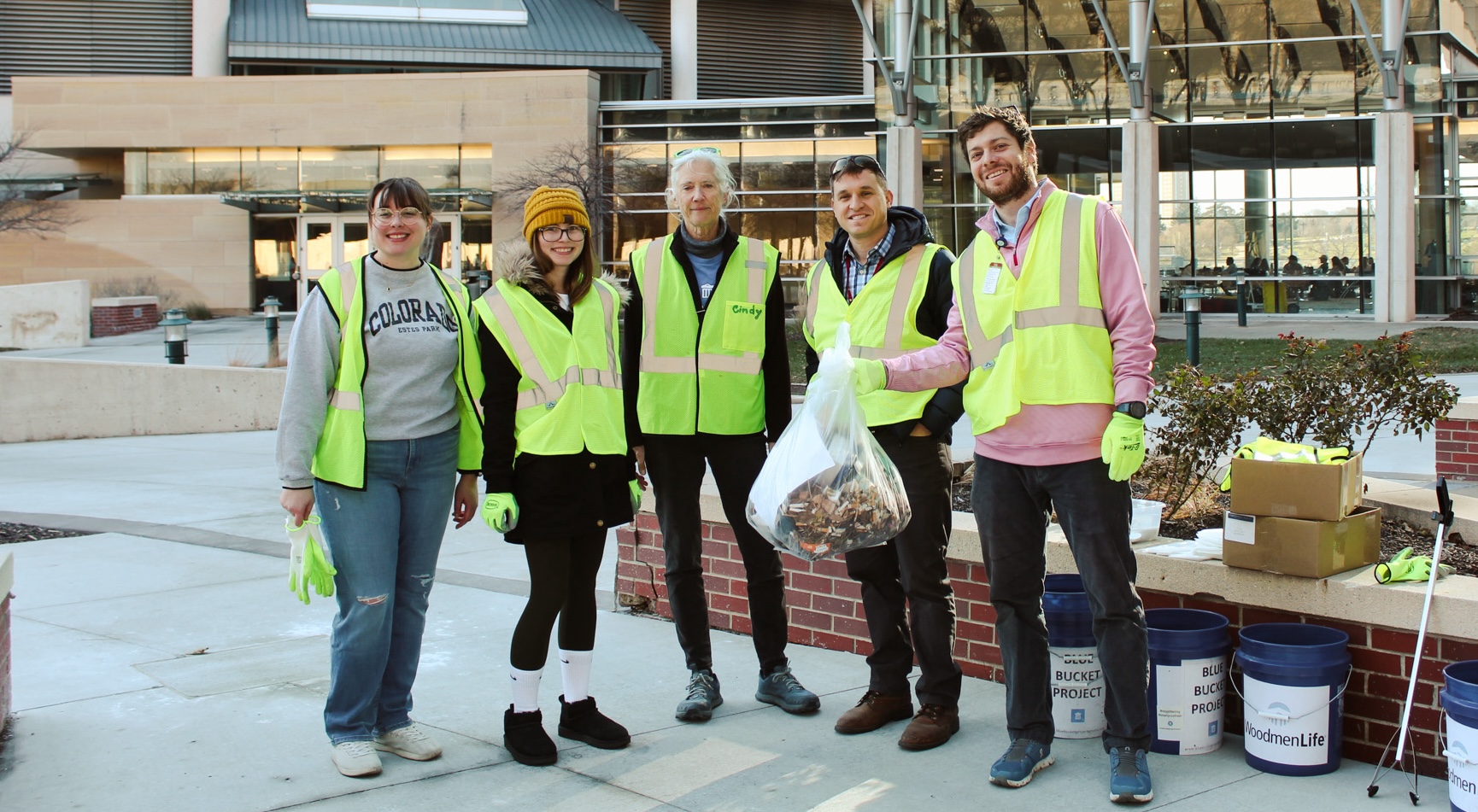
On Dec. 7, med center students, staff and faculty participated in a campus clean-up event, or a “flash trash mob,” outside the Durham Research Center.
Together, the participants filled one waste bag with litter that was sent to the landfill. Items that could be recycled were picked up and separated appropriately.
The 2020 National Litter Study found that there are almost 50 billion pieces of litter, or about 152 pieces per resident, along U.S. roadways and waterways. The study found that more than 207 million pieces of litter are personal protective equipment, such as gloves and masks.
Litter affects environmental, community and individual health, as well as quality of life, economic development, water safety, environmental justice and the urban habitat. Preventing litter from spreading further on and off campus makes the community healthier and safer and protects the natural environment.
Many clean-up participants noted how enjoyable and fulfilling it was to spend time outside, doing something meaningful to benefit their environment, campus and community. Participants also provided helpful feedback, such as identifying spaces on campus that could benefit from new waste infrastructure.
The event was made possible through support from the UNMC Office of Sustainability’s new community partner, the Blue Bucket Project. The Blue Bucket Project is a nonprofit with a mission to engage Omaha community members to make the city litter-free.
The organization leads “flash trash mobs” by completing one-hour litter clean-up projects throughout Omaha and providing all the supplies needed. It also offers free litter pick-up starter kits to households to clean up their neighborhoods.
Cindy Tefft, who represented the Blue Bucket Project for the event, said: “Part of the Blue Bucket Project’s mission is to provide equipment, resources and opportunities to groups, families or individuals who would like to help keep our community cleaner, safer, more attractive and litter-free. It is very rewarding seeing the difference we are all making for a more sustainable environment.”
Visit the Blue Bucket Project’s website to order a starter kit, organize an event or learn more about the organization.
Anyone interested in participating in future clean-up events can contact Jerrod Bley at the UNMC Office of Sustainability.
Med center holds events to celebrate sustainability

In October, the med center held several events for Campus Sustainability Month, engaging with students and the wider community.
Tree planting – On Oct. 24, the UNMC Office of Sustainability partnered with UNMC grounds to host a tree planting event. Two Autumn Blaze Maple trees were added to the campus canopy. Members of the office of sustainability spoke about the benefits of expanding campus green space, including promoting physical activity, relieving stress and reducing noise and air pollution. Attendees put pins on a campus map to show where they thought they could benefit from active commuting investments. Attendees also suggested names for the trees. Visit the med center’s new trees, Alexis and Leif Erickson, in the green space near the Home Instead Center for Successful Aging, upper lot 16.
Health and home performance – On Oct. 24, the UNMC Office of Sustainability partnered with several community organizations to host an event to educate the community about the connection between health and home efficiency. It was the first event held at the new Community Wellness Collaborative. As temperatures drop, weatherization techniques can help ensure that homes are comfortable and energy efficient. Weatherization provides such benefits as improved indoor air quality, less temperature related-illness and reduced hypertension. Shanda Ross, Nebraska Medicine’s director of engagement, outreach and belonging said, “We are proud to collaborate with the office of sustainability to provide resources to our community to help them better understand how sustainability and health go hand in hand, as well as provide them with support for home maintenance or energy assistance.” Speakers and community partners were:
- Lead poisoning prevention program – Anita Whitney, Douglas County Health Department
- Home repair program – Sara Zivny, Habitat for Humanity
- Natural gas safety and conservation – Julie Thacker and Ernie Bless, MUD
- Residential energy efficiency and energy efficiency assistance program – Eric Bensalah and Eddie Clark, OPPD
University of Nebraska Sustainability Summit – On Nov. 15, the University of Nebraska at Omaha was the site for the second annual NU System Sustainability Summit. The summit brought together university sustainability leaders and key parties to exchange knowledge and shape the future of sustainability at the University of Nebraska. Attendees participated in breakout sessions on a variety of topics, including the creation of Omaha’s Climate Action Plan and the role of technology in sustainable agriculture. The keynote address was delivered by Craig Moody, managing partner of Omaha-based environmental consulting company Verdis Group.
Sustainability Month offers events, opportunities to take action
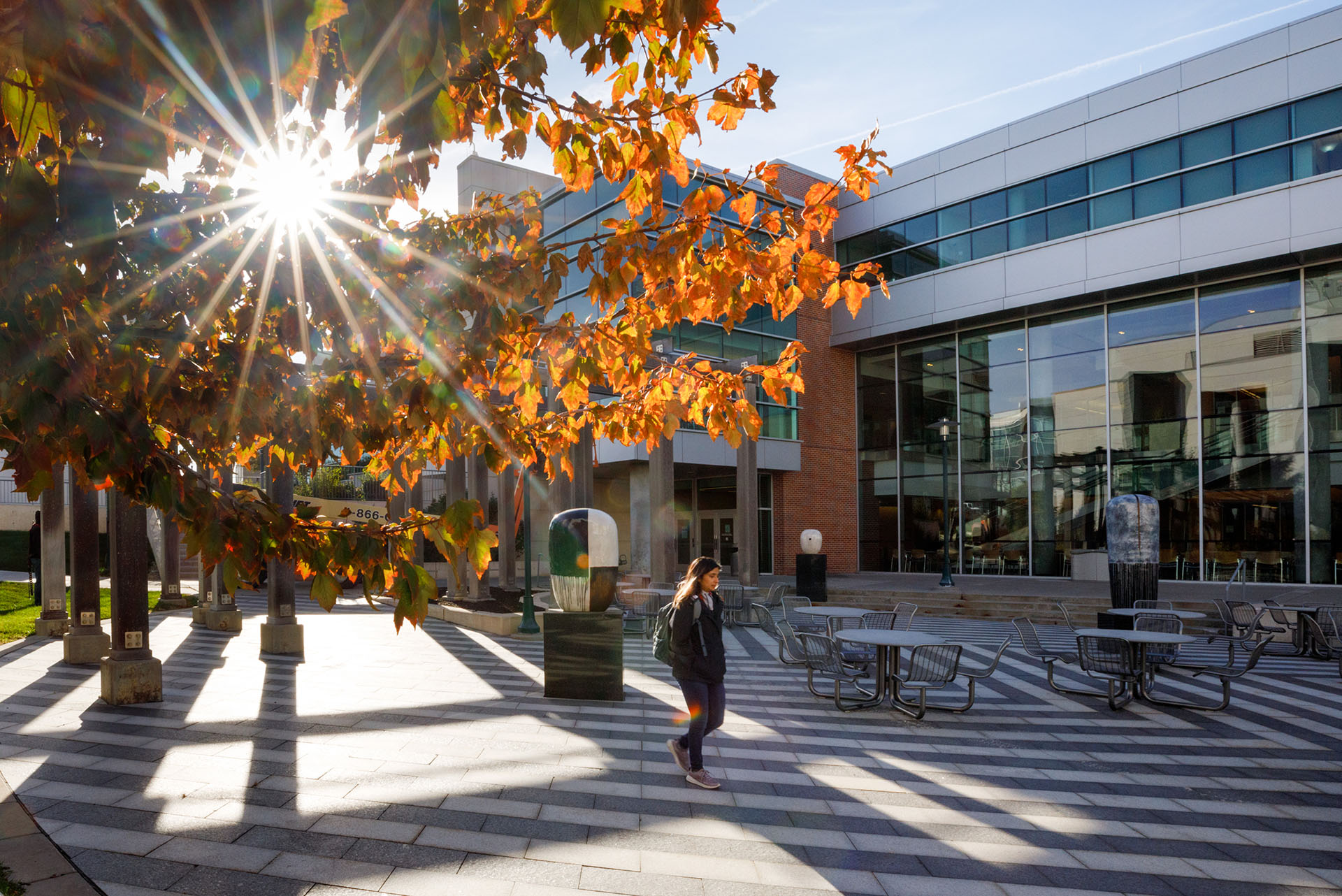
October is Campus Sustainability Month, an annual celebration of sustainability in higher education. Campuses worldwide educate and take action during October through webinars, events, challenges and more. The med center is celebrating through some great events and educational opportunities.
Tree planting event – On Oct. 24, the UNMC Office of Sustainability and grounds office is hosting a tree planting event on campus. The event will be held from noon to 1 p.m. in the green space near the Home Instead Center for Successful Aging (upper lot 16). Organizers will be planting an Autumn Blaze Mapletree and offer people a chance to learn more about the importance of trees on campus. Stickers will be offered to everyone who helps plant the tree. Submissions are open to offer ideas to name the tree. Attendees can submit name ideas at the event, and a winner will be chosen later this month.
Health and home performance – On Oct. 24 from 5-8 p.m. at the new Community Wellness Collaborative, located at 2120 N. 29th St., Suite 200, in Omaha, the Office of Sustainability will partner with community organizations to share knowledge and discuss the connection between health and home performance. Weatherization work can provide many health benefits, such as improved indoor air quality, less heat and cold related illness and reduced hypertension, which results in fewer hospital and medical visits. This event is open to the community and will have a variety of educational sessions. This event will have the following speakers and sessions:
- Health care and sustainability – Jerrod Bley, UNMC Office of Sustainability
- Lead poisoning prevention program – Anita Whitney, Douglas County Health Department
- Home repair program – Sara Zivny, Habitat for Humanity
- Natural gas safety and conservation – Julie Thacker and Ernie Bless, MUD
- Residential energy efficiency and energy efficiency assistance program – Eric Bensalah and Eddie Clark, OPPD
EcoChallenge – Throughout October, participants can compete alongside peers to be the most sustainable, as well as learn what others at the med center are doing to better the environment. There are a variety of actions people can take to focus on health, education, transportation and more. Click here to get started.
Sustainability Summit – Continue celebrating sustainability into November with the Nebraska University System Sustainability Summit. On Wednesday, Nov. 15, from 1-4 p.m. at the University of Nebraska at Omaha, attendees can find out what is happening on all four campuses, learn from experts and help shape the future of sustainability at the University of Nebraska. To attend the event, register here.
Also take action this October by:
- Signing up to be a Live Green ambassador
- Sustainably commuting with the TravelSmart program
- Refamiliarizing with the med center’s sustainability goals
- Inviting peers to do the same
Med center cuts down on waste at campus BBQ

For the past three years, the UNMC Office of Sustainability has strived to make the annual BBQ event zero waste, which means at least 90% of waste by weight is diverted from the landfill.
While the event didn’t reach the 90% goal, the Office of Sustainability was able to save almost 200 pounds from going to the landfill, while also engaging, educating and raising awareness among the med center community about sustainability efforts on campus that directly contribute to the med center’s net zero waste and engagement goals.
On Aug. 23, the campus held the #WeAreUNMC BBQ, where students, staff and faculty could mingle, learn about various groups and enjoy a meal together.
To make this event more sustainable, the Office of Sustainability set up waste stations that included compost, recycling and Hefty Orange bags, along with traditional landfill waste. With the help of volunteers, attendees were instructed on how to correctly sort their waste at the stations.
After the event, the aggregated waste from each station was weighed and recorded. In all, 74% of all waste material was diverted from the landfill, a substantial increase from the 65% diverted in 2022.
The breakdown of waste streams was:
- Compost: 93 pounds
- Recycling: 41.7 pounds
- Cardboard: 32.7 pounds
- Hefty Renew Bag: 14.1 pounds
- Landfill: 63.1 pounds
Julie Sommer, research facilities planner and a LiveGreen ambassador who volunteered at the BBQ, said: “I look forward to the UNMC Welcome BBQ every year. Volunteering to help sort waste is a great way to meet people and educate about sustainability on campus. The effort to make this a zero waste event is appreciated by many students and staff.”
Another volunteer, Emily Wiley, office associate for the medical laboratory science program, also had a great experience: “As someone who actively recycles, uses orange bags and composts at home, it was great to assist at this event and help to educate those who were in attendance. I hope that everyone learned something new or was inspired by what they saw to do more in their own home.”
Anyone interested in getting involved in sustainable events can sign up to be a LiveGreen Ambassador, send ideas for events that could go zero waste or sign up to volunteer for this event next year. With questions, email Jerrod Bley.
Med center offers benefits for ‘active commuting’
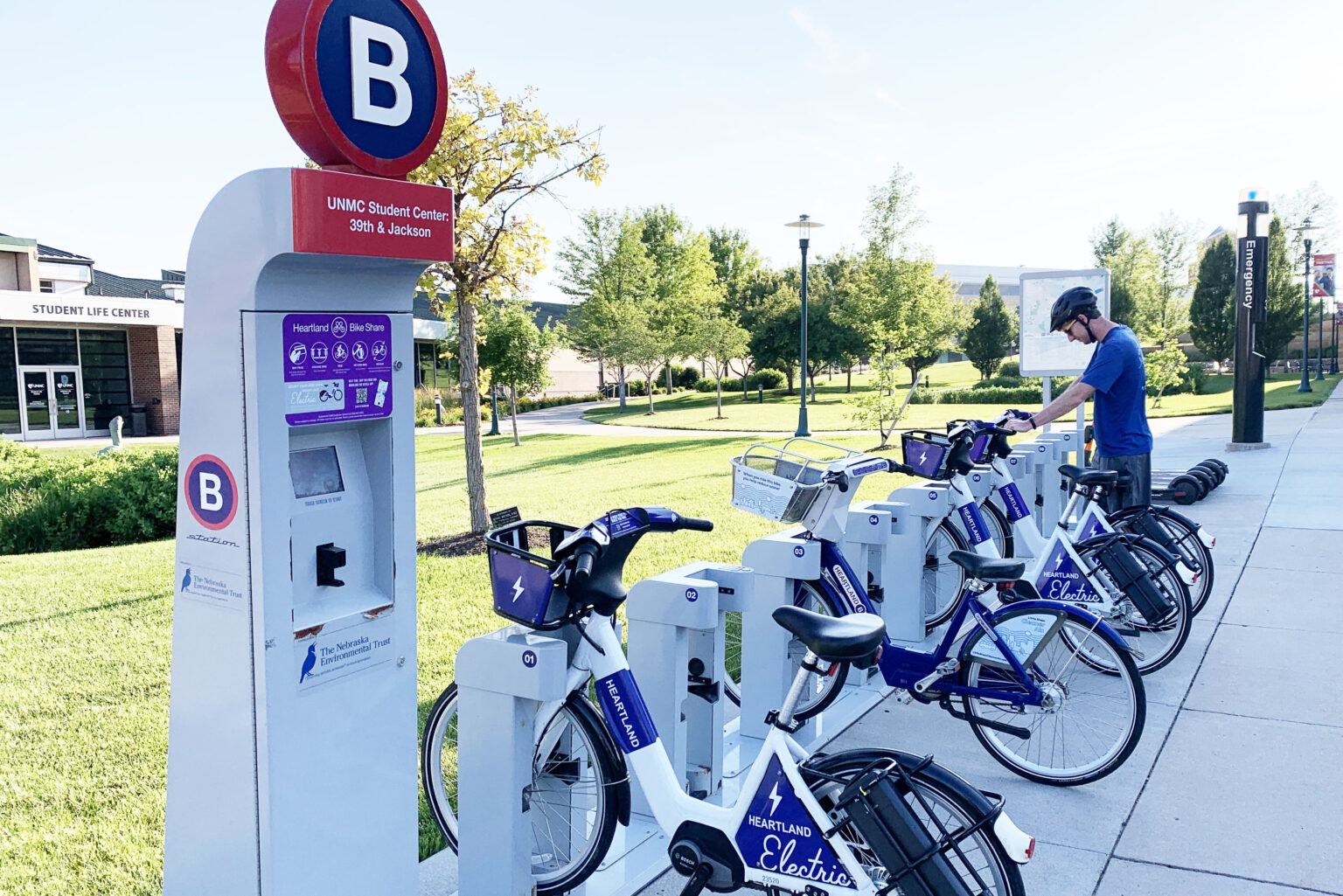
The results of the 2022 sustainability engagement survey indicated 40% of med center employee commute trips are made in a way other than driving alone in a car. This means employees are taking the bus, biking, walking, carpooling or working from home — and it’s considered “active commuting.”
Active commuting has several benefits, including reducing greenhouse gas emissions, reducing costs to the individual and improving individual and community health.
In 2012, only 12% of trips were made to campus in ways other than driving alone by car, and the goal was set to increase this to 20%. Since then, the med center has worked to support active commuters, primarily through the TravelSmart program, and the 20% goal was met in 2018.
The new goal was set at 35% by 2030, and that was achieved far ahead of schedule in 2022 with the 40% result.
This success is primarily due to more employees working from home, alongside small increases in biking, walking and other forms of sustainable transportation. The 35% goal will remain in place for now to account for changes in remote work policies implemented after the survey results were collected.
Data from the next survey, scheduled for 2024, will be used to continuously evaluate this goal. To learn more, check out the sustainability dashboard.
Anyone interested in getting involved can sign up for the TravelSmart program. When registering, choose from several modes of transportation and access benefits, including a free Omaha Metro bus pass, one-year Heartland B-cycle pass, reduced parking rates, emergency ride home program, access to secure bike parking, lockers and showers and more.
Important update: Another year of free Heartland B-Cycle memberships is available.
The Heartland B-Cycle program will offer a limited number of free one-year memberships to the med center community. This bike sharing system allows members to easily unlock, ride and return bikes at a network of more than 70 docking stations around the city.
Checking out a bike to travel across campus for meetings saves time and prevents the need to re-park a car. Bicycling also is a great way to reduce someone’s carbon footprint, support cycling infrastructure in Omaha and exercise, all at once. Heartland Bike Share even has electric-assist bicycles, which help with hills.
Click here to find detailed instructions for how to sign up for TravelSmart to get a promo code and activate a Heartland B-cycle membership.
President Carter releases NU System sustainability measures
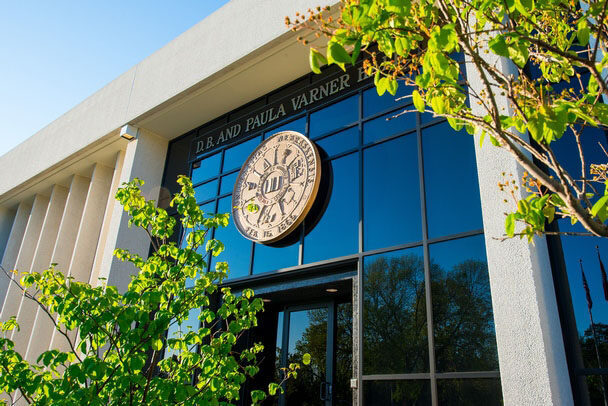
University of Nebraska President Ted Carter has released a new set of sustainability measures for the NU System, drawn from input and ideas from an 80-member team of faculty, staff and students from across the campuses.
The system-wide set of targets – a supplement to existing sustainability plans on the campuses – includes goals for increasing engagement and collaboration in sustainability efforts, using resources responsibly and continuing to integrate sustainability practices in facilities and procurement work where appropriate.
The goals were developed from more than 100 ideas generated by the President’s Sustainability Council, a group convened last year by Carter to help elevate and unite sustainability efforts across the system. Creation of system-wide sustainability measures is part of Carter’s Five-Year Strategy.
“Our goal is to be the best possible stewards of the resources entrusted to us – both natural and fiscal. I am very pleased to share these sustainability measures that reflect the common-sense values of our university and state,” Carter said.
“Our students, faculty, staff and community members have brought great energy and engagement to this effort, and I am thankful for their leadership. We will continue to work together with all Nebraskans to become even more effective and efficient in our use of our precious resources.”
The full sustainability document is available here. Goals include:
- Fund and hire student interns across the NU System to support sustainability outreach and engagement efforts.
- Host an annual Sustainability Summit, rotated among the campuses. The inaugural summit was held this fall at the University of Nebraska-Lincoln’s Innovation Campus.
- Establish a systemwide award to recognize excellence in sustainability. Details and application information on the inaugural award will be released this fall.
- Encourage re-use initiatives that reduce waste and support students, like “career closets” and programs that allow students to easily donate or recycle items when moving out of the residence halls rather than throw them away.
- Set systemwide targets for reducing energy use, water use and waste, and publicize annual progress toward the targets.
- Incorporate sustainability best practices into facilities planning; for example, prioritizing energy efficiency in university buildings to save costs.
- Promote more local purchases by adding a designation for “local” and/or “sustainable” products in the university’s procurement catalog.
- Develop strategies with vendors to reduce packaging waste.
Members of the university community are invited to share systemwide sustainability ideas by emailing the University of Nebraska System at this link.
